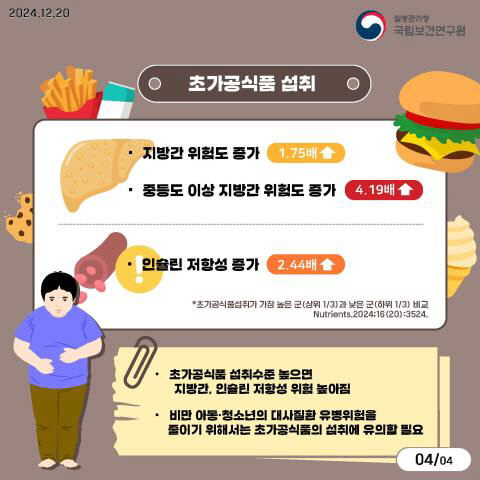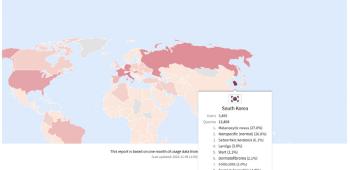Pointing out the cause of obesity in ultra-high-tech foods...Minimal processed foods double the weight loss effect
Aug 05, 2025
|
There are about 3 billion people worldwide who are overweight or obese. This is considered a factor that increases the risk of non-infectious diseases and early death, and recent changes in the food environment, such as an increase in ultra-processed food intake, have been raised as the background. Hyper-formal products are reported to be associated with chronic diseases such as obesity, cardiovascular disease, and diabetes, and public health policies are being promoted overseas to reduce hyper-processed food intake.
Recently, research and policy proposals related to children and adolescents have been active.
The Korea Centers for Disease Control and Prevention emphasized their 'obesity management' and urged them to be careful about excessive intake of 'ultra-processed foods'.
According to a study by the National Institute of Health of the Korea Centers for Disease Control and Prevention, obese children and adolescents who consume a lot of ultra-high official foods such as beverages, instant foods, and fast food have an increased risk of metabolic diseases. In the group with high consumption of super-processed foods, 44.8% of daily energy was obtained from super-processed foods, which had a 1.75-fold risk of 'fat liver' and a 2.44-fold higher risk of 'insulin resistance'. In particular, the risk of moderate or higher fatty liver, where more than 10% of fat accumulates in the liver, has been confirmed to increase by 4.19 times.
Fatty liver can cause inflammation by accumulating excessive fat in the liver, and insulin resistance, which is a condition in which insulin increases excessively in the blood due to poor blood sugar control, is at risk of leading to diabetes, so it is important to manage obesity and proper eating habits from an early age.
In the case of the United States, a recent report by the Committee on Make America Healthy Again headed by Secretary of Health and Human Services Robert Kennedy Jr. pointed out hyper-official foods, which account for 70% of children's calories in the United States, as the main cause of chronic diseases related to weight gain. This is based on the analysis that super processed foods contain high sugar, chemical additives, and saturated fats, which can cause a variety of chronic diseases such as obesity, type 2 diabetes, cardiovascular disease, and certain cancers.
Under these circumstances, clinical trials have shown that even with the same caloric and similar nutritional composition, the minimum processed food (MPF) is twice as effective as ultra-processed food (UPF). This is the result of a study by Dr. Samuel Deakin of University College London (UCL) published in the medical journal Nature Medicine on the 5th.
The research team divided 55 adults (43.2 years old on average) with a body mass index (BMI) of 25-40kg/㎡ and more than 50% of their calories from ultra-processed foods into two groups, ate ultra-processed and minimally processed foods for eight weeks, and then maintained their usual diet for four weeks, followed by a 2×2 cross-randomized controlled diet test in which ultra-processed and minimally processed foods were changed for the next eight weeks. Both diets were nutritionally identical in terms of calories and fat, saturated fat, protein, and carbohydrates, with no restriction on intake, and a total of 50 people completed the entire course.
Measurements of each diet after 8 weeks of implementation showed that both groups lost significant weight, but the extent of weight loss was significantly different. The minimum processed food group lost an average of 2.06%, nearly twice as much weight as the ultra-processed food group (1.05%). The weight loss of the minimum processed food group resulted from a decrease in body fat and total body content, and there was no change in muscle mass or fat-free mass, indicating that the overall body composition improved healthier. If this result is extended to one year, it is expected to lose 13% of weight for men and 9% for women.
The research team said the results suggest that choosing minimally processed foods and reducing intake of ultra-processed foods may be more effective in weight loss when following recommended dietary guidelines.
This article was translated by Naver AI translator.














